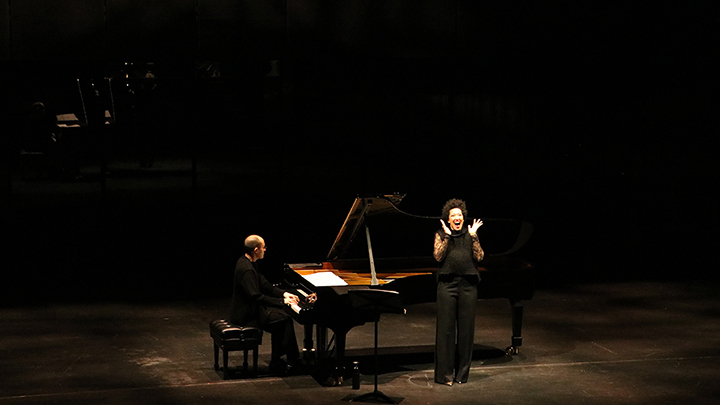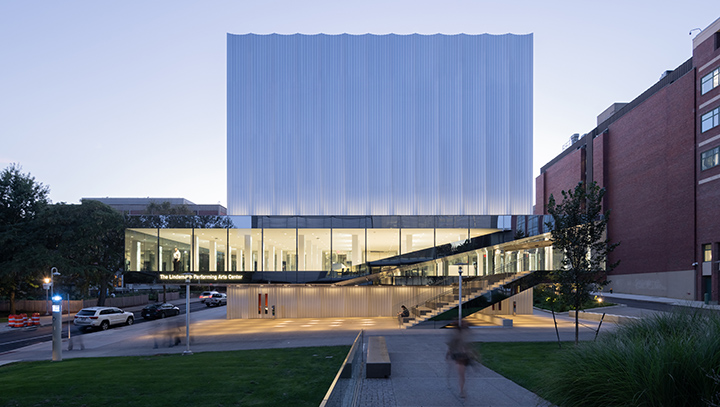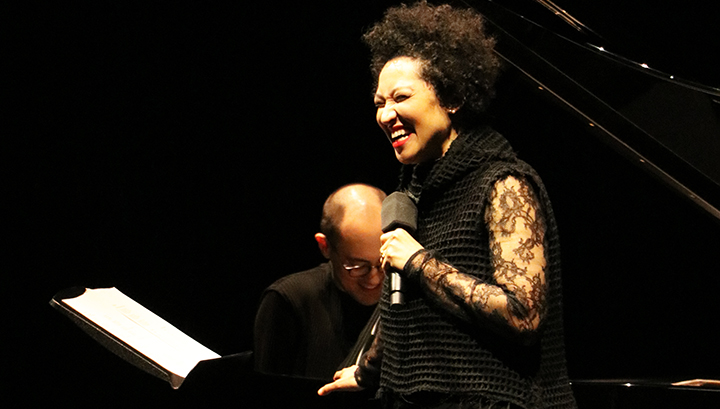This is, perhaps, a contradictory goal for a classical artist—aren’t we primed to praise a firm throughline? Even emission? Smooth registration? A program whose themes emerge quickly and clearly? Isn’t something lost when we hear the seams in the voice, in the music, in the recital format itself?
But Bullock’s goal is not to contradict. In drawing attention to the fault lines in both herself and in her chosen repertoire, she reveals that the artistry is in her fusing it all back together, in the dynamic process of re-composing a moment using texts and her body. The effect, as experienced on Wednesday in Providence at Brown University’s shiny new Joshua Ramus-designed Lindemann Performing Arts Center (yes, those Lindemanns), is quietly nuclear.
With carefully chosen repertoire, the stitching and refracting happens on multiple planes: take, for example, the set of nine Rodgers & Hammerstein songs that anchor the second half of the performance and form the program’s sentimental heart. She starts with the title song from The Sound of Music, performed with an alacrity and propulsion, something of a more solitary, introspective “Dich teure Halle,” followed by a set of songs from South Pacific. But it’s moments like the lead-in to “Some Enchanted Evening,” in which she sings both parts of the “Twin Soliloquies,” where her prismatic quality shines most clearly.
Of course, the grainy timbre of her middle register and her subtle ornamentation give the song a plain elegance. But as she finishes the song, a meditation on meeting the “perfect” woman, a perfect woman who, in the context of the musical, openly rejects the narrator’s biracial children and turns out to be the most MAGA character in American musical theater, before moving into the same character’s blithe “Cockeyed Optimist,” sung with a forthright honesty, Bullock’s own biracial identity receives reference. Her performance of the American songbook is less an interpretation than a transferred ownership with familiar songs, sung with a refreshing, unsentimental simplicity, buttressing her bond with the audience. “Something Good” was inflected with an inquisitive incredulousness while “Climb Ev’ry Mountain” became a true exhortation rather than a bombastically described formula for self-fulfillment.
It’s that bodily consciousness, I think, that makes Bullock such a moving, spiritual singer. As the piano churns (played by Bretton Brown, about whom enough positive things cannot be said), like it did during the jarringly modernist, “Introduction” from Marian Anderson’s 1965 album Jus’ Keep on Singin’ written by an unknown composer to be hummed and spoken, she presses her palm to her forehead, crosses her arms, even seems somewhat uncomfortable. What emerges feels grounded and personal and visceral.
Seizing on a theme of transcendence, she led directly into Alban Berg’s Altenberg Lieder. In five settings of texts from postcards by poet Peter Altenberg, Bullock’s tenuously genteel approach to the songs warmed from rather anonymous in the beginning across an entrancingly crunchy diminuendo at the end of the third song (“Über die Grenzen des All”) into a final song (“Hier ist Friede”) that vaunted and rattled across her range as the narrator describes the peace felt in a winter wood as “snow drips gently into pools of water.”
Water, as it turns out, is one of the many recurring motives (often linked to drowning) that ran throughout the program. Like a body of water, Bullock’s voice can often surge unpredictably with its tendency to spread towards the top and the unsupported quality of her lowest notes where her sound is at its most complex (which might explain why several low-set songs towards the end, including an arrangement by Bullock and her husband Christian Reif of Bob Dylan’s tiresome “Masters of War,” delivered with inky tone and lachrymose feeling, a silky rendition of Odetta’s arrangement of Dvorak’s “When I Get Home,” and Elizabeth Cotten’s “Freight Train,” buoyed by airy accompaniment by Brown, were performed with a microphone).
But Kurt Weill’s “Lament of the River Seine,” with its identically-intoned repetitions of “Au fond de la Seine…” whose objects grow increasingly dismal (gold, weapons, dead bodies, tears) show, in fact, that Bullock is more in control of her sound that she might seem. It makes the poetic effects of other numbers all the more praiseworthy, like the hollowed-out tone she applies to Francis Poulenc’s morose song “Mon cadavre est doux comme un gant” in which the vocal lines of the deceased narrator metaphorically describing her dead body reach higher and higher towards heaven.
Those songs teed up a series of songs that, she announced from the stage, were tributes to Hamlet’s Ophelia, a victim of “chauvinism, misogyny, and patriarchy.” Weill and Bertolt Brecht’s yet more morose “Ballad of the Drowned Maiden” poured out with a rich but unsettlingly matte coloring with Brown giving an almost playful account of the swirling arpeggios of the water. In an evening of intelligent collaboration, it was clearest here that Brown’s greatest gift is his sense for the internal stakes of each song—he finds and quickly maps the drama with firmness and texture.
From there she bounced to Richard Strauss’s Three Songs of Ophelia, where she spit out the first song with aspirated desperation, though the subsequent two songs might have benefitted from more dynamic variation. Finally, concluding the first half, the stillness of Ophelia’s final monologue gave way to the Spiritual “Deep River” where her complex lower head range (she’s not a chesty singer) spun out rich in shading and sentiment.
That Bullock puts these songs into conversation with voices the idea that subsuming or being swallowed up—by water or by music—may mean a baptism or a rebirth into memory as much as a death. Water can mean severing or distancing but it can also stand for renewal. And in the gentle ebbing of Bullock’s unfatigued voice, her final song, “How sad, how lonely,” the last of three songs by Connie Converse, gathered ripples of urban melancholy into piercing waves.
Yet water stands besides light (and levity) in Bullock’s elemental musicmaking; three Samuel Barber songs (“My lizard,” “Nuvoletta,” and “The Daisies) at the top of the program all overflowed with whimsy and invention (“Nuvoletta” especially, as she spit one paranoid melisma right into the lid of the open piano to an ethereally resonant effect), and her “Happily Ever After” from Once Upon a Mattress, unbelted but surely more virtuosic than Carol Burnett’s, was a comedic high point, as was what she described as a “feminist rebellion,” the aria “Non, monsieur mon mari…” from Poulenc’s Les mammelles di Tirèsias. All of these songs teased out another theme, touched on elsewhere across the eclectic program, of the suppression of women and the oppressive undercurrent to the picturesque fairytale ending.
But Bullock, unlike some other singers who weave pressing social themes into their recital work, doesn’t take herself so direly seriously (as evidence, she interrupted the program midway through the first half to say that she was recovering from a “gastrointestinal bug” and that she would try to continue the program but wanted to inform us just in case she had to “quickly dash offstage.”) She’s sincere, sunny, and earnest. Like Ophelia in the water, she lets the texts and the music overwhelm her as delicate bubbles of hopeful song float to the surface.
Light, air, and water came together decisively in that Rodgers and Hammerstein set with a deep, prophetic “Bali Ha’i.” Bullock’s serene focus and Bretton Brown’s flourishes at the piano so delicate as to make the piece sound like a Ravel mélodie were yet another instance of Bullock’s humane repossession and new embodiment of this song, a song she said shows “what the power of positive visualization can do,” for the audience. The effect, like the recital itself, was strange and healing.
Photos: Peter Chenot and Iwan Baan






